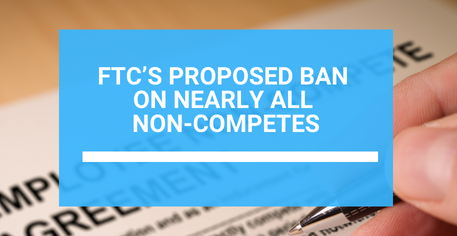A new proposed rule by the FTC can impact employers

FTC’S PROPOSED BAN ON NEARLY ALL NON-COMPETES
On January 5, 2023, the Federal Trade Commission (“FTC”) published a proposed rule that would ban nearly all past, current, and future non-compete agreements, with limited exceptions.
PURPOSE
The FTC determined that nearly one in five Americans (approximately 30 million people) are bound by a non-compete clause. It is the FTC’s position that such restrictive clauses create decrease competition, prevent new businesses from forming, stifle entrepreneurship, and prevent novel innovation that would otherwise occur without such restrictions. It is the FTC’s position that the removal of non-compete clauses would increase American workers’ earnings between $250 billion and $296 billion per year.
BREAKING DOWN THE PROPOSED RULE
WHAT IS COVERED?
The FTC’s proposed rule considers it an unfair method of competition for an employer to enter into or attempt to enter into a non-compete clause with a worker, maintain a non-compete clause, or represent to a worker that the worker is subject to a non-compete clause.
The FTC defines a “non-compete clause” as a contractual term between an employer and worker that prevents the worker from seeking or accepting employment with a person, or operating a business, after the conclusion of the worker’s employment with the employer. The term “worker” includes without limitation, an employee, independent contractor, extern, intern, volunteer apprentice, or sole proprietor who provides a service to a client or customer.
Ultimately, this definition expands the scope of coverage from the traditional non-compete agreements executed between the employer and worker. Instead, the FTC will utilize a “functional test” to determine whether the terms of employment are de facto non-compete clauses. As an example, a non-disclosure or non-solicitation agreement that is written so broadly that it effectively precludes the worker from working in the same field as the employer after termination would be considered a non-compete clause under this proposed rule.
WILL NON-COMPETES ALREADY IN EXISTENCE BE AFFECTED?
The short answer – yes. The FTC’s proposed rule would require an employer to rescind any and all non-compete clauses with its workers. This includes any non-complete clauses with prior workers as well. In order to comply with the proposed rule, employers would be required to provide notice of such rescission to both existing workers as well as former workers that are bound by a non-compete clause. Such notices would include an acknowledgment that the worker’s non-compete clause is no longer in effect and may not be enforced against the worker.
CAN A NON-COMPETE FIT INTO AN EXCEPTION?
Yes – in limited circumstances. The FTC’s proposed rule would not apply to non-competes entered into between a buyer and seller of a business or otherwise all of the seller’s ownership interest in a business entity as long as the seller is holding at least a 25% interest in the business.
CAN MY STATE OVERCOME THE FTC’S RULE?
If the proposed rule becomes final, it would supersede any State’s statutes, regulations, orders, or interpretations of them that are not consistent with the proposed rule. A State would continue to be permitted to impose restrictions on non-compete clauses that provide greater protections to the worker than is provided under the proposed rule.
WHAT IS NEXT?
The proposed rule is the first step in the FTC’s rulemaking process. After publishing a proposed rule in the Federal Register, the FTC will receive public comments which are due within 60 days. Here, the comment period is open through March 10, 2023. Thereafter, The FTC may make additional changes or modifications before submitting the final rule. A final rule would take effect upon 60 days after its publication in the Federal Register. Important for employers, the compliance deadline would then be set 180 days thereafter.
It is possible the proposed rule may eventually be struck down; however, it is a good time for businesses to spend some time reviewing their policies and procedures. In addition, with such uncertainty, businesses should audit and determine their risk profile as it pertains to their non-compete clauses. As always, for assistance or more information, please contact Matthew Bolewitz, Partner at Cozza Law Group at (412) 294-8444 or mbolewitz@cozzalaw.com. We would be happy to help.
Cozza Law Group Business Law Blog
©2024 Cozza Law Group PLLC, All Rights Reserved.
Privacy Policy



